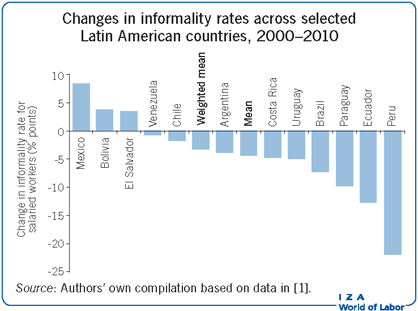Elevator pitch
Developing countries have long been struggling to fight informality, focusing on instruments such as labor legislation enforcement, temporary contracts, and changes in taxes imposed on small firms. However, improvements in the labor force’s schooling and skill level may be more effective in reducing informality in the long term. Higher-skilled workers are typically employed by larger firms that use more capital, and that are more likely to be formal. Additionally, when skilled and unskilled workers are complementary in production, unskilled workers’ wages tend to increase, adding yet another force toward reducing informality.
Key findings
Pros
Informality is strongly responsive to the composition of the labor force.
A labor force with higher levels of schooling generates incentives for firms to grow and formalize.
A more-educated labor force increases the relative wages of low-skilled workers, reducing their incentives to work in the informal sector.
In the long term, human capital investments may be more effective tools to fight informality than labor market policies focused on particular institutions.
Cons
The composition of the labor force does not respond to policy changes in the short term.
The effect of schooling is driven primarily by the entrance of new and better-educated cohorts; thus, immediate changes in informality may be hard to achieve.
Human capital has a strong effect on informality only when the minimum wage is binding and/or initial unemployment is high.
Further research is needed because most existing theories of informality exclude the schooling channel in their basic assumptions (e.g. wages of informal, unskilled workers do not respond to aggregate schooling levels).
